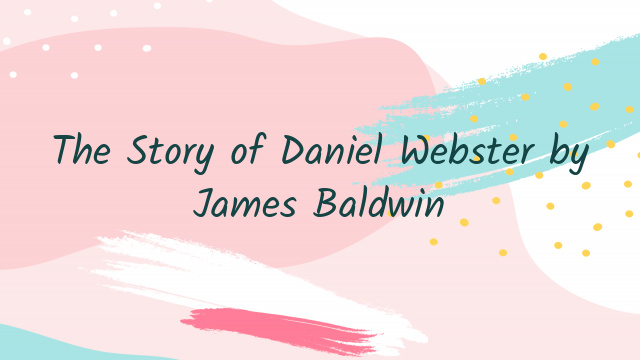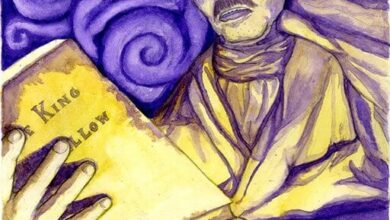
The Story of Daniel Webster by James Baldwin
Chapter III: Ezekiel and Daniel
Ezekiel Webster was two years older than his brother Daniel. He was a strong, manly fellow, and was ready at all times to do a kindness to the lad who had not been gifted with so much health and strength.
But he had not Daniel’s quickness of mind, and he always looked to his younger brother for advice and instruction.
And so there was much love between the two brothers, each helping the other according to his talents and his ability.
One day they went together to the county fair. Each had a few cents in his pocket for spending-money, and both expected to have a fine time.
When they came home in the evening Daniel seemed very happy, but Ezekiel was silent.
“Well, Daniel,” said their mother, “what did you do with your money?”
“I spent it at the fair,” said Daniel.
“And what did you do with yours, Ezekiel?”
“I lent it to Daniel,” was the answer.
It was this way at all times, and with everybody. Not only Ezekiel, but others were ever ready to give up their own means of enjoyment if only it would make Daniel happy.
At another time the brothers were standing together by their father, who had just come home after several days’ absence.
“Ezekiel,” said Mr. Webster, “what have you been doing since I went away?”
“Nothing, sir,” said Ezekiel.
“You are very frank,” said the judge. Then turning to Daniel, he said:
“What have you been doing, Dan?”
“Helping Zeke,” said Daniel.
When Judge Webster said to his neighbor, “I am going to try to educate my boys,” he had no thought of ever being able to send both of them to college.
Ezekiel, he said to himself, was strong and hearty. He could make his own way in the world without having a finished education.
But Daniel had little strength of body, although he was gifted with great mental powers. It was he that must be the scholar of the family.
The judge argued with himself that since he would be able to educate only one of the boys, he must educate that one who gave the greatest promise of success. And yet, had it not been for his poverty, he would gladly have given the same opportunities to both.
Chapter IV: Plans for the Future
One hot day in summer the judge and his youngest son were at work together in the hayfield.
“Daniel,” said the judge, “I am thinking that this kind of work is hardly the right thing for you. You must prepare yourself for greater things than pitching hay.”
“What do you mean, father?” asked Daniel.
“I mean that you must have that which I have always felt the need of. You must have a good education; for without an education a man is always at a disadvantage. If I had been able to go to school when I was a boy, I might have done more for my country than I have. But as it is, I can do nothing but struggle here for the means of living.”
“Zeke and I will help you, father,” said Daniel; “and now that you are growing old, you need not work so hard.”
“I am not complaining about the work,” said the judge. “I live only for my children. When your older brothers were growing up I was too poor to give them an education; but I am able now to do something for you, and I mean to send you to a good school.”
“Oh, father, how kind you are!” cried Daniel.
“If you will study hard,” said his father—”if you will do your best, and learn all that you can; you will not have to endure such hardships as I have endured. And then you will be able to do so much more good in the world.”
The boy’s heart was touched by the manner in which his father spoke these words. He dropped his rake; he threw his arms around his father’s neck, and cried for thankfulness and joy.
It was not until the next spring that Judge Webster felt himself able to carry out his plans to send Daniel to school.
One evening he said, “Daniel, you must be up early in the morning, I am going with you to Exeter.”
“To Exeter?” said the boy.
“Yes, to Exeter. I am going to put you in the academy there.”
The academy at Exeter was then, as it still is, a famous place for preparing boys for college. But Daniel’s father did not say anything about making him ready for college. The judge knew that the expenses would be heavy, and he was not sure that he would ever be able to give him a finished education.
It was nearly fifty miles to Exeter, and Daniel and his father were to ride there on horseback. That was almost the only way of traveling in those days.
The next morning two horses were brought to the door. One was Judge Webster’s horse, the other was a gentle nag, with a lady’s side-saddle on his back.
“Who is going to ride on that nag?” asked Daniel.
“Young Dan Webster,” answered the judge.
“But I don’t want a side-saddle. I am not a lady.”
“Neighbor Johnson is sending the nag to Exeter for the use of a lady who is to ride back with me. I accommodate him by taking charge of the animal, and he accommodates me by allowing you to ride on it.”
“But won’t it look rather funny for me to ride to Exeter on a lady’s saddle?”
“If a lady can ride on it, perhaps Dan Webster can do as much.”
And so they set out on their journey to Exeter. The judge rode in advance, and Daniel, sitting astride of the lady’s saddle, followed behind.
It was, no doubt, a funny sight to see them riding thus along the muddy roads. None of the country people who stopped to gaze at them could have guessed that the dark-faced lad who rode so awkwardly would some day become one of the greatest men of the age.
It was thus that Daniel Webster made his first appearance among strangers.




